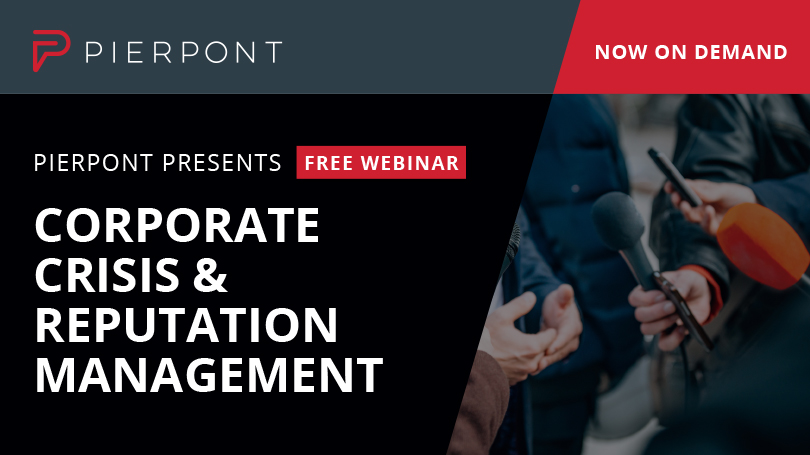Crisis and Reputation Management: Tips For When a PR Crisis Strikes

In late July, Pierpont Communications held its first “Pierpont Presents” webinar. Chris Jones, Senior VP at Pierpont, was joined alongside Dennis Duffy, Director at Kane Russell Colemen Logan PC. Moderated by Christine Rashman, Vice President at Pierpont, this webinar focused on the evolution of crisis response and how crisis and legal teams work hand-in-hand to ensure brand integrity.
Chris Jones reflects on the webinar and shares his key takeaways.
In the first installment of “Pierpont Presents,” I had the privilege of discussing the crucial collaboration between legal and communications teams in PR and crisis communications. Alongside Dennis Duffy, we unpacked the necessity of cross-functional teamwork in managing crises.
Evolution of Crisis Management
Reflecting on my past career in the oil and gas industry, I was given an extraordinarily rich crisis experience across various sectors. Dennis, with his extensive legal expertise spanning 40 years, highlighted how the legal and PR teams have evolved over the years.
“30 years ago, the two (legal and crisis communications) would’ve stayed in their lanes. In today’s world, it’s essential to make crisis communications part of the legal team, and vice versa.”
Decisions made by one party directly affect the other, and over time the two teams realized how crucial it is to collaborate and make key decisions together. Working together ensures that all steps are completed and that all decisions are beneficial for all parties involved.
Prioritizing & Aligning Goals
During our discussion, Dennis and I emphasized the importance of prioritizing risks and aligning core values early in the crisis management process. Whether the focus is on defending a lawsuit, protecting brand reputation, or safeguarding personal reputations, this alignment acts as a guiding principle for all subsequent decisions.
Setting the Tone
Studies have shown that the tone of initial media coverage can significantly impact a company’s market value for up to a year post-crisis. Setting the appropriate tone from the beginning is crucial, and this is where the collaboration between legal and communications teams becomes indispensable. Regular, real-time communication among all parties involved is essential to ensure alignment and consistency and prevent missteps that could worsen the situation.
Crisis Plans & Real-Time Updates
Having a crisis plan in place is invaluable, but flexibility is key. Templated responses provide a starting point, yet they must be adapted based on added information as a crisis unfolds. Regular updates and training exercises are essential to ensure these plans’ effectiveness and to prepare all team members adequately.
Fast-Forward: Post-Crisis Recovery
If all efforts to collaborate and stay ahead of any crises have been working, then there is less to do in terms of repairing an organization’s reputation. From a PR perspective, the next step would be to return to traditional PR and exit crisis mode. Focusing on telling the company’s story and continuing to do what we do.
On the other hand, there are many times when we will get called up specifically to mitigate a crisis. That can get tough when you do not already have values or a program in place.
Dennis shared his perspective from a legal standpoint, where the typical first step is to go into the organization and look for places within the group that may need policy changes. Finding the root of the cause can help ensure that it does not happen again. Usually this results in implementing a specific training program.
Advice for Companies Without Dedicated PR or Legal Teams
For companies lacking in-house PR or legal teams, seeking external expertise immediately ahead of or during a crisis is crucial. The initial hours are critical, and having both legal and communications specialists involved from the beginning can make a significant difference in managing the crisis effectively.
Chris’ Topline Takeaways
If there are any key takeaways from this conversation, they are the following:
- Collaborate Early: Start this line of communication between the two teams as early as possible, ensuring that you are prepared if and when a crisis occurs.
- Be Consistent: Maintain consistency in internal and external communications to build trust and credibility.
By working hand in hand, we can ensure that all decisions are beneficial for all parties involved, safeguarding both the legal standing and the public reputation of our organizations.
Watch the Pierpont Presents webinar on demand: https://my.demio.com/ref/J2dxo3Xm1P9WmwiI
Contact Us